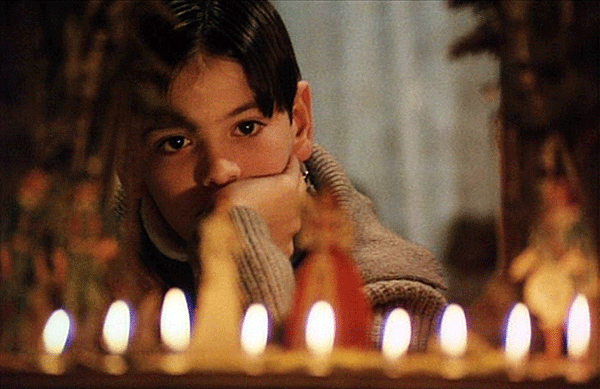Fanny & Alexander (Ingmar Bergman, 1984): Sweden
Reviewed by Kevin Tran. Viewed on DVD.

What makes Fanny & Alexander a great Christmas movie is its overwhelmingly vivid visual. The plot takes place in Sweden around the turn of the century during Christmastime, primarily in the Ekdalh mansion. We see the world through the eyes of Alexander, a young boy that infatuated with the theater, as he celebrates the holiday with his family. The film is long (the complete televise version runs 6 hours long, while the theatrical version is a little over 3), and follows Alexander and his sister, Fanny, through their imprisonment living with a coldhearted Bishop their mother marries after their father’s untimely death. The set is full of lush reds and beautiful ornaments that are captured by Sven Nykvist’s stunning camera work.
If you placed Ingmar Bergman’s Fanny & Alexander next to the kinds of films being made in Hollywood in the 1980s, one will find a huge contrast in both style and themes. For Hollywood, it was the decade of the blockbusters. Where films such as First Blood, Top Gun, and Die Hard ruled the box office both domestically and internationally. Technology was changing how films were made and conversely Hollywood was making more expensive kinds of movies. Although Fanny & Alexander was the most expensive film Bergman (or Sweden for that matter) has ever made; the film has deep roots in a combination of art and independent cinema, as Bergman is famously known for throughout his early career. This is combined with a kind of soft, warm realism that can be seen in his later years working in theater and television, most notably in Scenes from a Marriage.
Bergman is famous for being one of the first filmmaker to express feelings of existentialism. God is dead and life is full of suffering. In Fanny & Alexander, Bergman does not do so as directly as in his previous films. Compared to other Bergman films, Fanny & Alexander is much more plot oriented. Which probably explains why it is his most assessable film. However, because Fanny & Alexander is a Bergman film, we do see a slant that is common and consistent in all of his films. For example, his relentless respect for the actors, artists, and most especially the theater. Bergman is telling us this is where happiness, life, and beauty are found. This is opposite to the cold, harsh, and brutal world that is reflex religion and God in the film.
If I were you, I would watch the televised version throughout December. The time put in is well worth it. In my opinion, it’s one of the greatest pictures from the 80s. It’s Bergman’s final farewell to film and considering he is one of cinema’s most important figure, it is a must see for all fans. It encapsulates everything he wanted to say about life, death and art. It’s his masterpiece.
2 Comments
Jump to comment form | comments rss [?] | trackback uri [?]